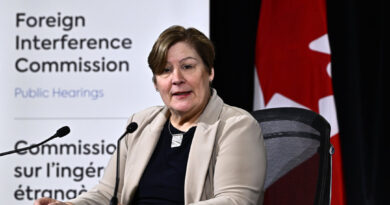Energy Minister Expresses Confusion Over Trump’s Tariff Decision After Meeting with US Lawmakers
Canadian Energy Minister Jonathan Wilkinson mentioned that U.S. lawmakers responded positively to his proposal to enhance energy cooperation between the two countries. He also noted that the lawmakers he conversed with seemed uncertain about President Donald Trump’s intentions regarding tariffs.
Wilkinson traveled to Washington, D.C., this week, where he had meetings with members of the U.S. Senate and House of Representatives.
This visit followed Trump’s decision to temporarily halt tariffs on Canada for 30 days to evaluate the actions Ottawa is taking to strengthen border security and combat fentanyl trafficking.
The minister expressed that he didn’t receive much clarity from his U.S. counterparts on what President Trump might be seeking when deciding whether to impose tariffs after the 30-day pause concludes.
“It’s currently unclear what the president’s specific goals are,” Wilkinson said during a briefing call with reporters on Feb. 6. “Even senior Republican senators are somewhat in the dark on these issues.”
He emphasized that the border was a significant area of concern and highlighted Trump’s focus on the U.S. trade deficit with Canada. Wilkinson and others have pointed out that the United States has a trade surplus with Canada when energy imports are excluded from the calculations.
Trump also voiced concerns about U.S. financial institutions being excluded from Canada’s banking sector. While U.S. banks have a commercial and investment presence in Canada, personal banking is mainly controlled by the prominent “big six” Canadian banks.
Wilkinson mentioned that the banking issue was not discussed during his talks in Washington.
On the morning of Feb. 3, after an initial call with Prime Minister Justin Trudeau regarding the announced U.S. tariffs and Canada’s response plan, Trump criticized Canada’s banking regulations. He also referenced an ongoing “drug war,” claiming that drugs are entering the U.S. from Mexico and Canada.
Several Trump administration officials have rejected the notion that the United States is seeking a trade war with its neighbors, framing the issue as a “drug war.”
During his Senate confirmation hearing on Feb. 6, Trump’s nominee for U.S. trade representative, Jamieson Greer, indicated that the tariff threat against Canada is related to fentanyl trafficking, a potent synthetic opioid that has had severe impacts on communities on both sides of the border.
Despite the looming threat of tariffs, Wilkinson highlighted that he visited the U.S. capital to propose a “win-win” situation where both countries benefit from increased trade rather than facing a “lose-lose” scenario due to tariffs affecting citizens and businesses on both sides of the border.
“Instead of focusing on tariffs, Canada could support the new administration in achieving some of its campaign goals, such as maintaining low energy prices and enhancing national security vis-à-vis China and Russia,” he explained.
He also mentioned that this approach could assist Trump in fulfilling his goal of U.S. “energy dominance” by receiving more hydrocarbons from Canada for export to global markets, leading to job creation and economic opportunities in Canada.
Regarding the dependency on the U.S. market being a vulnerability, Wilkinson did not specify if he supports expanding the domestic pipeline infrastructure.
The Canadian Press contributed to this report.





